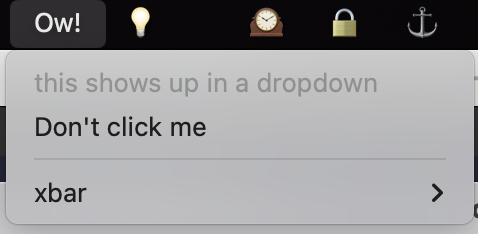Mac toolbar widgets with xbar and rust
(aside - I have some much bigger blog ideas but haven’t had the time to write them properly - so here’s just a small thing I find handy)
Lately I wanted some toolbar widgets - mostly for looking at CI/CD build statuses - and I stumbled across XBar.
What is XBar?
XBar is a nifty tool for Mac OSX machines which puts little UI widgets on your toolbar. (It started as an older project called Bitbar, which was abandoned for a while - there is a similar alternative called SwiftBar for those who want options)
One of the marvellous things about XBar is how very simple it is. It very much follows the “Unix philosophy” - every plugin is a very simple executable script - if it succeeds (e.g. exit status 0) then the STDOUT is parsed and used to display a toolbar widget. If it fails, then STDOUT is parsed and displayed on an error widget.
So for example a very simple plugin might just be a bash script:
#!/usr/bin/env bash
echo "Ow!"
echo "---"
echo "this shows up in a dropdown"
echo "Don't click me | shell=\"/usr/bin/say\" param1=\"ow\""
If you copy the above to an executable file in ~/Library/Application\ Support/xbar/plugins/ow.1m.sh and refresh XBar, it will show up as a little drop-down menu:

Click the “Don’t click me” button and the command /usr/bin/say ow is run.
The script even refreshes itself - based on the file name. In ow.1m.sh the 1m means “re-run this every 1 minute” - so every minute the script is run and the UI is refreshed.
The UI is all based on text - but unicode is supported, so you can do fairly creative things to make it prettier.
Hang on, you mentioned rust…
Naturally I wanted to do more than can just be done in bash. I really wanted to write plugins in rust - but rust is a compiled language, so it can’t really be run as a script, out of the box.
There are some ways around this though.
You can just copy a binary executable into the Plugins folder. If I compile a rust binary, then copy it to ~/Library/Application\ Support/xbar/plugins/my-thing.1m.o it will work! However - XBar does more than just execute the file - it also looks for special comments in the file to add metadata - things like the author name, or configuration information. And you can’t put comments inside a binary file.
A second thing I tried was to just write a bash plugin which calls my rust code - this works well, but it’s a little fiddly. This is actually what I use at work to build node.js plugins with a full package.json dependency file.
For rust though I found exactly what I needed - rust-script - which basically allows you to write a script like:
#!/usr/bin/env rust-script
println!("Hello world!");
And then the rust-script system will compile the code (if needed - it caches compiled binaries) and run it, like a shell script.
I did have to do one tweak though - XBar doesn’t run in a user shell, so /usr/bin/env doesn’t have access to your path - and rust-script is installed by cargo in ~/.cargo/bin - but you can tell /usr/bin/env what path to use with a bit of fiddling.
A very simple rust xbar plugin looks like:
#!/usr/bin/env -S PATH=/Users/${USER}/.cargo/bin:${PATH} rust-script
println!("Hello world!");
println;("---");
println!("drop down content here");
A proper rust example
This is a more realistic example. I added a main function, and a comment block at the top - both to define XBar metadata but also to fetch rust dependencies:
#!/usr/bin/env -S PATH=/Users/${USER}/.cargo/bin:${PATH} rust-script
//! hello-xbar
//! <xbar.title>XBar time</xbar.title>
//! <xbar.author>Korny Sietsma</xbar.author>
//! <xbar.author.github>kornysietsma</xbar.author.github>
//! <xbar.desc>Basic rust xbar sample</xbar.desc>
//! ```cargo
//! [dependencies]
//! chrono = "0.4.39"
//! ```
fn main() {
let dt = chrono::Local::now();
let humantime = dt.format("%l %M %p and %S seconds").to_string();
println!("🕰️");
println!("---");
println!("{}", humantime);
println!("say it! | shell=\"/usr/bin/say\" param1=\"The time is {}\"", humantime);
}
This gives a neat little clock widget similar to:

If you click “say it” a voice reads the time, sort-of.
A bigger example - mpd-xbar-demo
I also have a more full-featured demo: mpd-xbar-demo on github
This lets me do basic controls for MPD (the Music Player Demon) which I use to play music at home.
On top of the approaches described above, it adds:
- A cargo.toml project file - not essential, but very helpful to let editors help you with dependencies
- a config setting - xbar allows you to define script configuration in environment variables
- Installation instructions!
Finally be warned - XBar is neat, but sometimes configuration is fiddly. I’ve had to run killall -9 xbar more than once when things got stuck.
